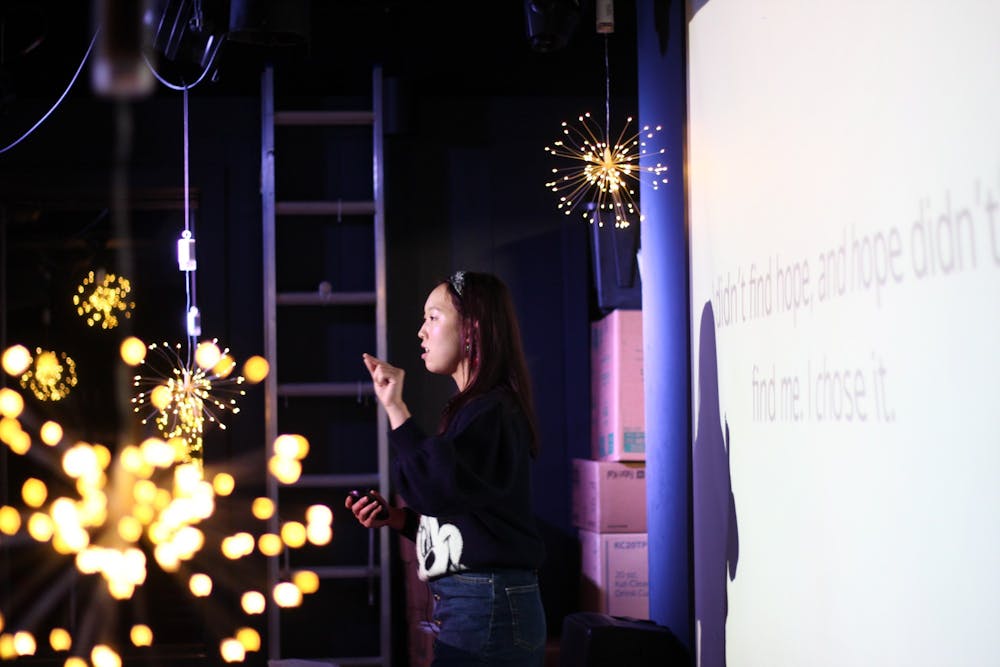During TEDxUVA’s annual Student Speaker Conference Wednesday night, students shared stories ranging from self-empowerment to the need for diversity and inclusion in different fields. Nine different TED Talks competed for a spot to present at the organization’s main conference this spring with industry professionals.
TEDxUVA is the University's chapter of TED, a nonprofit that hosts conferences to spread ideas — usually in the form of short, powerful speeches called TED Talks. TEDxUVA independently hosts two conferences, the first of which was a student conference at Boylan Heights in the fall. It will be followed by a professional conference at the Rotunda this spring.
Roughly 200 people attended the student conference, which was promoted through TEDxUVa’s social media pages in the weeks leading up to the event.
“Our goal with this is just to spread new ideas and inspire people to take up different things in life,” said Avaneen Pinniti, second-year College student and member of the TEDxUVA Executive Board for Logistics.
First up were second-year College students Mackenzie Green and Grant GianGrasso, who are both first responders. The two discussed compassion fatigue, a condition where over-exhaustion can lead to a decrease in empathy — something both Green and GianGrasso have battled while volunteering.
Next, fourth-year Commerce student Lizzy Lynch presented “Magic in the Mundane,” which detailed her strategy for turning the routine training required for running a marathon into a form of self-discovery and a means of finding peace.
Fourth-year College student Jennifer Li’s talk discussed the considerable need for diversity in the technology field. Li focused specifically on racial biases built into software and the inaccuracy of facial recognition in surveillance cameras depending on race, noting how the belief that algorithms are more objective than humans is false — they are actually only as good as their creator, Li said.
Hope was a centerpiece of first-year College student Aimee Kang’s presentation. Kang is a cancer survivor and has a sister with special needs. She spoke about her journey to finding her own form of self-empowerment and acceptance.
First-year Engineering student Jason Morefield, who defeated a Grandmaster-Elect in September to become the Virginia State Chess Champion, gave a talk about accessibility issues in chess. He noted that a lack of resources and instructors in low income schools created a large barrier to entry for many young talented students.
“If the resources we need do not already exist, we are going to have to make them,” Morefield said.
Morefield has been volunteering directly with low-income students in the past few years, hoping to increase the accessibility for new players to learn the game.
Third-year Commerce student Sam Felder told her story of growing up with a stutter and how despite this, she has worked to live with it through different phrasing techniques and has been able to pursue her passion of being a spin instructor.
One speaker, second-year Engineering student Will Renken, described his passion for fun hobbies and personal projects — Renken’s passion project is designing his own Iron Man armor.
“The best hobbies are those that are never done,” Renken said during his presentation.
Fourth-year College student Alec Sherwood spoke about how environmentally positive interactions could further national goals for sustainability and preservation as well as helping students overcome mental health difficulties.
Last was fourth-year College student Chris Obolensky, who demonstrated how music has the power to bring people together and bond human beings. Obolensky specifically mentioned how the Good Old Song brings the University community together during sporting events.
TEDxUVA’s student-run executive board will pick a winner from these nine presentations based on the audience's reaction and how well each talk would fit into the theme of their spring conference. The date for the spring conference has yet to be announced, but will likely occur in early April.
CORRECTION: A previous version of this article incorrectly referenced Jason Morefield twice. The article has been updated to correct this.







